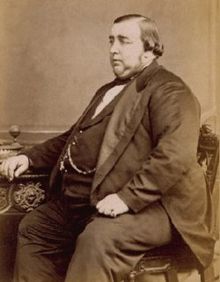Arthur Orton | |
|---|---|
 Arthur Orton, 1872 | |
| Born | 20 March 1834 |
| Died | 1 April 1898 Marylebone, County of London, England |
| Other names | Thomas Castro |
| Occupation |
|
| Years active | 1866–1898 |
| Known for | Tichborne Case |
Arthur Orton (20 March 1834 – 1 April 1898) was an English man who has generally been identified by legal historians and commentators as the "Tichborne Claimant", who in two celebrated court cases both fascinated and shocked Victorian society in the 1860s and 1870s.
The son of a London butcher, Orton went to sea as a boy, spent a year in Chile, and worked as a butcher and stockman for squatters in Australia in the middle-to-late 1850s. In 1866 Thomas Castro, a butcher from Wagga Wagga in Australia, claimed to be Roger Tichborne, the heir to the Tichborne estates and baronetcy who had been declared lost at sea in 1854. During the protracted court proceedings that followed Castro's claim, evidence was produced that Castro might in fact be Arthur Orton, attempting to secure the Tichborne fortunes by imposture. The verdict of the jury in Regina versus Castro (1873–74) was that Castro was not Roger Tichborne, and that he was Arthur Orton. He was sentenced to fourteen years imprisonment for perjury. After his release he lived in great poverty, still insisting that he was Tichborne. In 1895 he confessed to being Orton, but retracted almost immediately. He died in 1898; the Tichborne family allowed a coffin plate bearing the names "Sir Roger Charles Doughty Tichborne" to be placed on the coffin, not because his claim had been conceded, but because "[n]o legal means of preventing such an outrage existed".[1]
Commentators have generally concurred with the court's verdict that the Claimant was Orton, but some 20th-century analysts have raised uncertainties about this accepted view, and have suggested that, although the Orton identity remains the most likely, a lingering doubt persists.